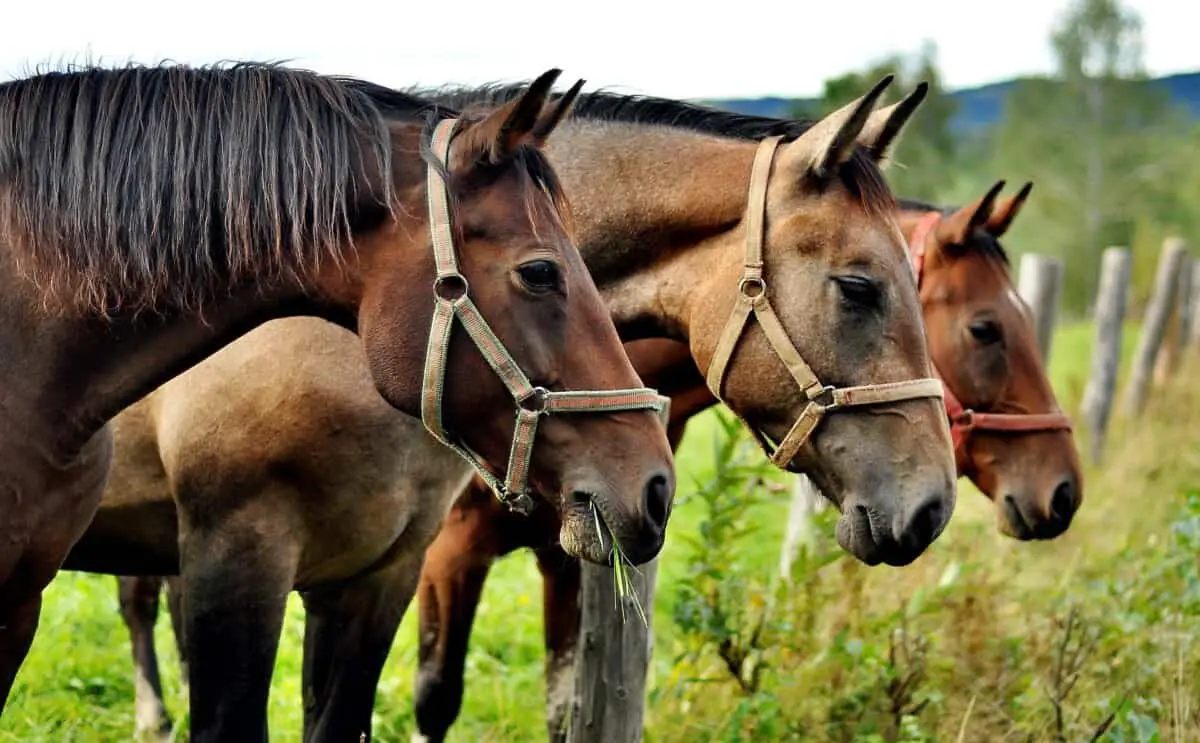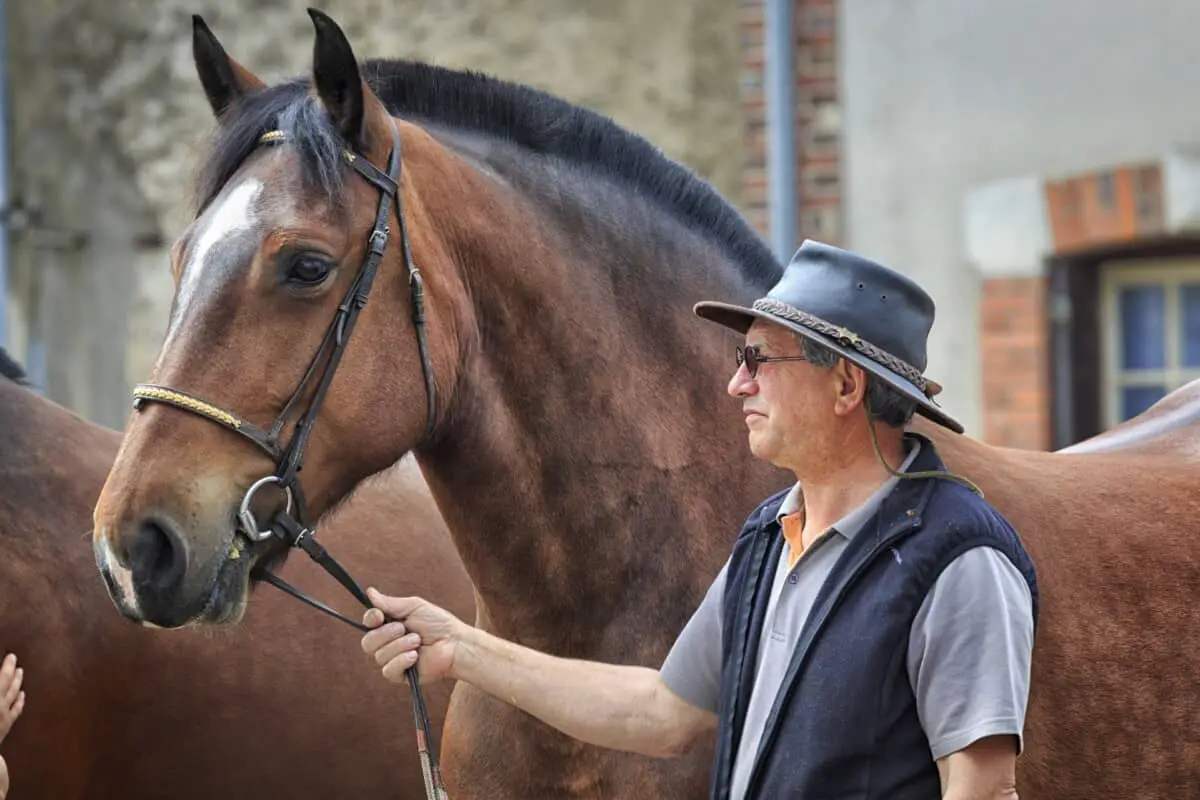Skip To Section
Are horses smart animals? Scientists believe that a horse is as intelligent as a three-year-old child. Japanese scientists have confirmed that horses do indeed possess advanced and flexible cognitions, and can dumb down their communicative behavior to a human’s knowledge state.
So, the short answer is yes; horses are smart. But how smart is smart?
Domestic animals like dogs and cats have been widely celebrated the world over for their intelligence. Dogs are believed to be twice as smart as cats because they have twice the number of cortical neurons (over 530 million) than cats (250 million).
What Is Smarter A Dog Or A Horse?
Dogs are said to be smarter than cats. But a direct comparison of intelligence across species does not work too well, because there is no single standard of “smartness” across differently evolved species. For example, if you were to measure an animal’s intelligence by its ability to climb a tree, a cat would score higher than a dog – and a monkey would score higher than a cat.
Brain size, tools used, vocabulary, and social learning are some metrics to measure animal smartness. Still, it’s difficult to compare between species because most intelligence tasks and tests are designed for specific species. So, asking if a dog is smarter than a horse or vice versa will not give you the right answer.
Having said that, scientists believe that horses can learn faster, while dogs are better problem solvers. Many scientists also believe that dogs have been bred to be more intelligent (like the sheepdog) so that they can help humans – more so than horses.
How then, are we to know – are horses smart, and if they are, exactly how smart is a horse?

New Research That Suggests Equine Intelligence
Japanese scientists Shinya Yamamoto and Monamie Ringhofer of Kobe University, conducted intensive research to answer some vital questions about horse intelligence. The first question they needed an answer to was – can domestic horses, like other domestic animals, send visual and tactile signals (like dogs and cats) to their helpful but ignorant caretakers in a problem-solving situation; and, if they could, how did they do this?
Another question that was examined was whether a domestic horse altered its behavior based on its caretaker’s knowledge.
In the first experiment, an assistant hid some carrots in a bucket that couldn’t be reached by the horse. When the caretaker came along, the horse sent visual and tactile signals to the caretaker to make him aware of the hidden carrots. The horse would touch and push the caretaker and even look at him. The results of the study showed that when a horse could not solve a problem on its own, it would send visual and tactile signals to humans.
The second experiment tested if a horse’s behavior changed when the caretaker was aware of the hidden carrots. The results revealed that a horse would send more signals when the caretaker did not have knowledge of the hidden food. This demonstrates that horses adapt their behavior according to the human’s knowledge level.
The study revealed that horses possessed high cognitive skills that enabled them to adapt their behavior towards humans according to the human’s knowledge of a situation.
Other Studies That Answer The Question, “Are Horses Smart?”
The Kobe University research is not the only research conducted to find out if horses are smart. Here are some proven facts about equine intelligence – their cognitive abilities and skills, rather than their intelligence alone.
Studies show that horses are highly social animals. They can:
- Recognize human emotions
- Communicate with humans
- Learn through conditioning
- Match voices to faces
- Recognize short words and their meanings
- Learn daily routines (such as feeding times)
- Horses can work out problems like opening a stable door and freeing themselves when they get stuck somewhere.
- With correct and consistent training, horses are swift learners.
- A 2017 study by the University of Sussex noted that horses could read human body language and could detect if humans displayed a dominant or submissive posture – even if they were not familiar with that person. The study further noted that domestic horses were more likely to approach those who took up a submissive body posture.
- Horses communicate via body language with their own kind but also with other species as well.
- A 2018 study by the Universities of Portsmouth and Sussex demonstrated that horses could read facial expressions. They can even remember a person’s previous emotional state and adapt their behavior accordingly. During the study, horses responded differently to the human emotions they observed. Their heart rates increased when they were presented with pictures of angry people, and they showed negative reactions to more aggressive emotions.
When horses met the people whose pictures they were earlier presented, the horses continued to demonstrate an increased heart rate when they met the people who portrayed angry expressions in the photos – even though these people maintained neutral emotions when they met the horses. It was surprising that the horses remembered the people and their emotions even though they were presented the pictures of these people for a very short time.
How Horse Owners Can Improve Their Relationship With Their Horses
Now that you know how smart horses are, you can use this information to improve your relationship with your horse.
The intelligence of each horse must be measured differently.
Horses will act upon what they perceive from your body language. It’s critical for anyone handling horses to be conscious of the signals they send out to their horse when interacting with them. This will help in creating a positive relationship with them.
Riders and horse owners must remember that horses can remember emotions. Your emotions can affect the long-term relationship that you have with your horse.
Understanding a horse’s communication traits can help horse owners, riders, and trainers to create stronger bonds with their equine companions and make themselves better caretakers.
Some Horses Are Smarter Than Others
Some horse breeds are known to be smarter than others. For example, Arabian horses and Thoroughbreds are two breeds that seem to be much more intelligent than others.
Some horses are known to be more intelligent than others and have even acquired fame because of this. Lukas, a retired racehorse, attracted international recognition for his intelligence. He is known to be able to identify shapes, colors, numbers, and letters. He can understand complicated concepts related to spatial awareness, proportions, absentness, object permanence, and so on.
Beautiful Jim Key is another horse that was known for its intelligence. Beautiful Jim Key was foaled in 1889. He was part Standardbred and part Arabian and was known for his many tricks, as well as his ability to read, write, and do arithmetic with numbers below 30. He was even able to cite any Bible passage that mentioned horses. Patience and kindness were the only tools used to teach this horse.

Do Horses Know Who Their Owners Are?
Until recently, it was known that horses could discriminate between familiar and unfamiliar people and different human faces. But a 2012 study by British behavior researchers reveals that horses can do much more. The study suggests that horses appear to be capable of matching voices to faces when it comes to humans they know. The research further suggests that horses can recognize their owners by their voices.
Do Horses Remember You?
Yes, horses can remember you.
The same 2012 study by British animal behaviorists, mentioned above, found that horses can recognize and distinguish humans through auditory and visual cues, suggesting that horses can remember you. Dr. Leanne Proops, the lead researcher, explains that the process is similar to how humans can match a person’s face to their voice.
Some Of The Smartest Animals In The World
Dogs and cats are not the only smart animals around. Several other animals exhibit intelligence.
- Chimpanzees are known to have better memory skills in some tasks than humans. They also have excellent tool-making skills and have the ability to learn to communicate using sign language.
- Goats are known to have excellent long-term memory.
- Elephants have fantastic memories, are capable of empathy, and can work together to solve problems.
- Parrots are capable of reproducing sounds of human languages, and some are known to be able to understand the meaning of words.
- Dolphins can identify their reflections in a mirror and exhibit cognitive abilities to imitate human postures.
- New Caledonian crows are one of the most skilled tool-making and tool-using birds who make hooks and probes from leaf stems and sticks to poke into the crowns of palm trees.
- Scrub-jays are not motivated by instinct (building a nest, for example) or immediate needs (like hunger). Instead, they plan their future and store food that they believe will be in short supply in the future. This complex skill was previously thought to be uniquely human.
What Is The Smartest Animal?
Chimpanzees are thought to be the most intelligent in the world, and they have superb cognitive abilities to prove it. But if brain-size were to be the metric of “intelligence,” and not cognitive abilities, then dolphins would be right behind modern humans with regard to intelligence. If intelligence were measured by body mass to brain ration, the boffins would be the winners.
Conclusion
Horses are known to be as smart as 3-year-old human children – that is very smart when you think about how easily these young ones figure out how to use a mobile device. But horses are not just as smart as three-year-olds – they are much more intelligent. There is enough evidence to suggest very high equine intelligence, and we may not be fully aware of exactly how smart horses really are. Only further studies and research dedicated to the subject can throw light on this matter.
What we have, though, is enough evidence to suggest that horses can understand us, recognize us, learn from us, and communicate their needs to us. They can sense our emotions, pick up on, and differentiate between positive and negative signals. They have strong cognitive abilities and can even communicate their needs through body language, as well as visual and tactile signals. They can recognize their owners and familiar faces, as well as their voices.
Horses might not be on the list of the world’s top 5 most intelligent animals, but they are very smart – there is enough and more research to prove that. The question is, what are we going to do with all this information? Can it be used to our advantage and help better the lives of our horses? There is a lot of information on what horses are capable of doing. It is up to horse owners and caretakers to make use of all this information to form better relationships with their horses, create stronger bonds, and ultimately become better horse owners and caretakers.
